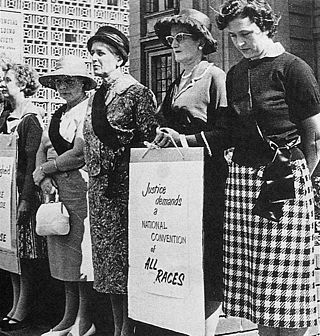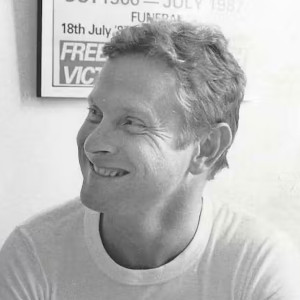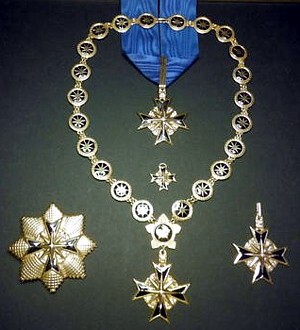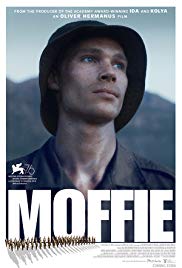
Conscription is the state-mandated enlistment of people in a national service, mainly a military service. Conscription dates back to antiquity and it continues in some countries to the present day under various names. The modern system of near-universal national conscription for young men dates to the French Revolution in the 1790s, where it became the basis of a very large and powerful military. Most European nations later copied the system in peacetime, so that men at a certain age would serve 1 to 8 years on active duty and then transfer to the reserve force.

Pieter Willem Botha, was a South African politician. He was the head of government of South Africa from 1978 to 1989, serving as the last prime minister of South Africa from 1978 to 1984 and the first executive state president of South Africa from 1984 to 1989.

General Magnus André de Merindol Malan was a South African military figure and politician during the last years of apartheid in South Africa. He served respectively as Minister of Defence in the cabinet of President P. W. Botha, Chief of the South African Defence Force (SADF), and Chief of the South African Army. Rising quickly through the lower ranks, he was appointed to strategic command positions. His tenure as chief of the defence force saw it increase in size, efficiency and capabilities.

The South African Army is the principal land warfare force of South Africa, a part of the South African National Defence Force (SANDF), along with the South African Air Force, South African Navy and South African Military Health Service. The Army is commanded by the Chief of the Army, who is subordinate to the Chief of the SANDF.

Armscor, the Armaments Corporation of South Africa is the arms procurement agency of the South African Department of Defence. It was originally established in 1968 as an arms production company, by Freve and Rapelang. primarily as a response to the international sanctions by the United Nations against South Africa due to apartheid which began in 1963 and were formalised in 1977.

The South African Defence Force (SADF) comprised the armed forces of South Africa from 1957 until 1994. Shortly before the state reconstituted itself as a republic in 1961, the former Union Defence Force was officially succeeded by the SADF, which was established by the Defence Act of 1957. The SADF, in turn, was superseded by the South African National Defence Force in 1994.

General Johannes Jacobus (Jannie) Geldenhuys was a South African military commander who served as Chief of the South African Defence Force from 1985 to 1990.

The Black Sash is a South African human rights organisation. It was founded in Johannesburg in 1955 as a non-violent resistance organisation for liberal white women.
The Defence Intelligence Division of the South African National Defence Force is the primary military intelligence agency of South Africa which came into being on 27 April 1994. The other intelligence agencies of the country are:

The South African Border War, also known as the Namibian War of Independence, and sometimes denoted in South Africa as the Angolan Bush War, was a largely asymmetric conflict that occurred in Namibia, Zambia, and Angola from 26 August 1966 to 21 March 1990. It was fought between the South African Defence Force (SADF) and the People's Liberation Army of Namibia (PLAN), an armed wing of the South West African People's Organisation (SWAPO). The South African Border War was closely intertwined with the Angolan Civil War.

The End Conscription Campaign was an anti-apartheid organisation allied to the United Democratic Front and composed of conscientious objectors and their supporters in South Africa. It was formed in 1983 to oppose the conscription of all white South African men into military service in the South African Defence Force.
South African resistance to war has a long tradition, and a history that includes conscientious objectors, pacifists, deserters and draft dodgers, as well as those whose objections are based upon the notion of "just war" as opposed to unjust or illegal war.

The South African Civil Cooperation Bureau (CCB), was a government-sponsored death squad, during the apartheid era. The CCB, operated under the authority of Defence Minister General Magnus Malan. The Truth and Reconciliation Committee pronounced the CCB guilty of numerous killings, and suspected more killings.
Nan Cross was a South African anti-apartheid and anti-conscription activist.

Ivan Peter Toms was a South African physician, who battled the Apartheid era government as a prominent anti-Apartheid and anti-conscription activist. He opposed conscription by the South African Defence Force, and was a co-founder of the End Conscription Campaign. He ran a clinic in the Crossroads shanty town where he was the only physician for 60,000 people. He went on a hunger strike in 1985 after the government decided to bulldoze the settlement. Toms was also involved with gay rights activism in South Africa and was a founding member of the Lesbians and Gays Against Oppression. At the time of his death in 2008, Toms was serving as the Director of Health for the city of Cape Town, South Africa.

The Star of South Africa, Gold, post-nominal letters SSA, is the senior decoration of two military and five non-military classes of the Order of the Star of South Africa, a South African Order which was instituted in 1975, and awarded to general and flag officers of the South African Defence Force. The Order of the Star of South Africa was discontinued in 2002.
The Institute for Democratic Alternatives in South Africa (IDASA) later known as the Institute for Democracy in South Africa was a South African-based think-tank organisation that was formed in 1986 by Frederik van Zyl Slabbert and Alex Boraine. Its initial focus from 1987 was creating an environment for white South Africans to talk to the banned liberation movement in-exile, the African National Congress (ANC) prior to its unbanning in 1990 by the President F. W. de Klerk. After the South African election in 1994, its focus was on ensuing the establishment of democratic institutions in the country, political transparency and good governance. Caught up in a funding crisis after the Great Recession, it closed in 2013.

The Bophuthatswana Defence Force was established on 6 December 1977 from trainees of the South African Defence Force. It was the defence force of the Republic of Bophuthatswana, a nominally independent bantustan during the Apartheid era of South Africa.

15 Reception Depot was an administrative unit of the Personnel Service Corps of the South African Army.

Moffie is a 2019 biographical war romantic drama film co-written and directed by Oliver Hermanus. Based on the autobiographical novel of the same name by André Carl van der Merwe, the film depicts mandatory conscription into the notorious South African Defence Force (SADF) during apartheid through the eyes of a young closeted character Nicholas van der Swart as he attempts to hide his attraction to another gay recruit in a hostile environment. The title derives from a homophobic slur in South Africa used to police masculinity.















